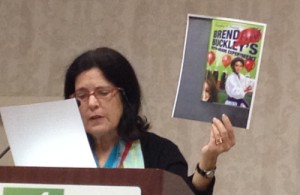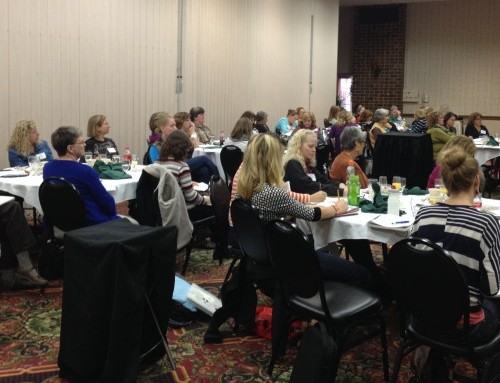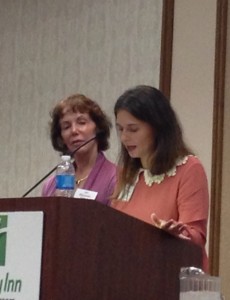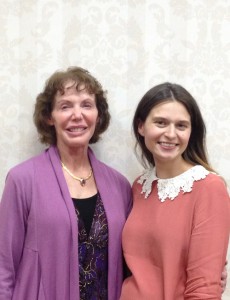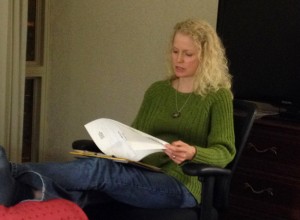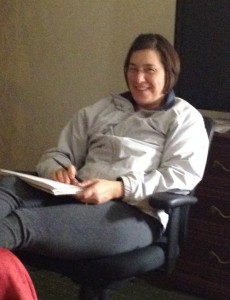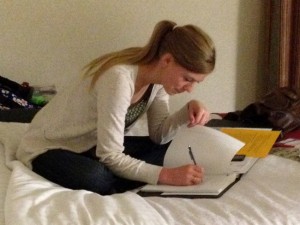During her presentation, “The Write Place at the Write Time”, Michelle Poploff urged Iowa SCBWI Conference attendees to put historical fiction on our to-write lists. She motivated us by sharing the process toward publication of successful Delacorte Press’ historical fiction novels; among them, Moon Over Manifest by Clare Vanderpool, Paper Covers Rock by Jenny Hubbard, Running Out of Night by Sharon Lovejoy (to be published in 2014).
Finding Your Voice
Later Poploff emceed the “Finding Your Voice” portion where attendees whose names were drawn read the first 500 words of their manuscript and provide on-line elevator pitch synopses. This was my favorite part of the conference because it gave writers the opportunity to shine. They shared their words with the rhythm and inflections they envisioned. Most of them had wrung these words out of their minds onto paper through blood, sweat, and tears. Now they were able to share their bounty with other sweaty, bloody, teary-eyed writers. The exercise enabled writers to be heard. That’s what all writers want.
Publication Teamwork
Christine Kettner, Art Director, Houghton Mifflin Harcourt, and Illustrator Jennifer Black Reinhardt, walked us through the journey of making middle grade novel The Adventures of A Southpole Pig. On the other end of the spectrum, Allison Remcheck, Assistant to Rosemary Stimola, and Jan Blazanin, Iowa author and Young Adult Mentor, gave us an inside look at Blazanin’s successful query letter to the Stimola Literary Studio, how she snagged the agency to represent her, and how Stimola, Remcheck, and Blazanin became an effective team.
I’m the poster child for the artistically-challenged, but both road-to-publication re-enactments were equally fascinating. Unless you know a published author, illustrator, agent, or editor personally, you can’t get this inside information without attending a conference. I’ll share some choice tidbits:
- Directors, agents, and editors’ inboxes are swamped, so make your email query subject line stand out.
- Don’t put all of your eggs in one manuscript. Your first manuscript may not be the manuscript that gets published.
- Read as many books as possible in your intended genre.
- Never pay someone to read your work for representation.
- Self-publishing may sabotage your chances of being published later.
The Story Only You Can Tell
Joanna Cardenas, Assistant Editor, Viking, Penguin Group, USA, presented “Mastering the Deceptively Simple Art of the Picture Book” and “Author as Self-Promoter”. In picture books, she looks for humor, clever dialog, a memorable plot, and a distinct point of view. She wants to read the story that only you can tell. She quoted Leonard Marcus: “Picture books are stories told in two languages–text and art.”
A sampling of Cardenas’ self-promoting tips:
- Publishers rarely can afford to offer book tours anymore, so you will need to do a lot of footwork yourself.
- A website is key, but starting social media and not keeping up can hurt you. (Now she tells me.)
- Teachers can help others discover your book.
- Pool your efforts with other authors.
- Offer workshops for kids that pertain to your work.
I hope you’ve enjoyed this post-view of the 2013 IA SCBWI Conference. Maybe I’ll meet you there in person next year. (Remind me to take more pictures in 2014.)

